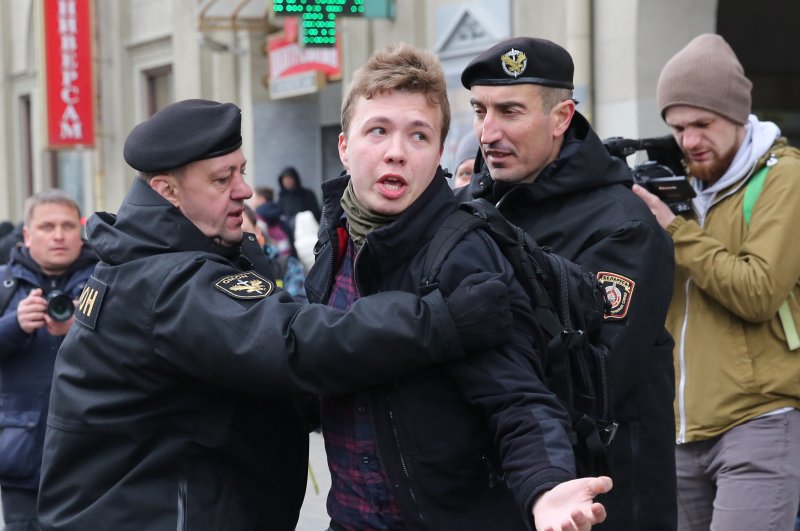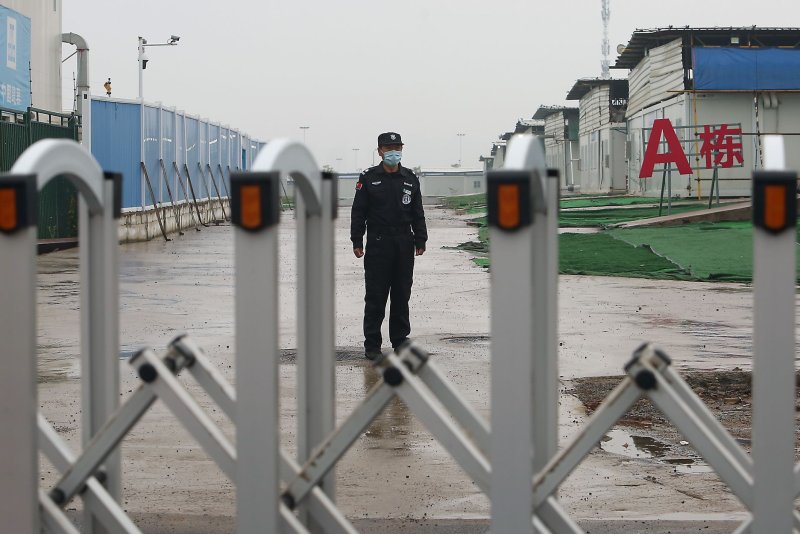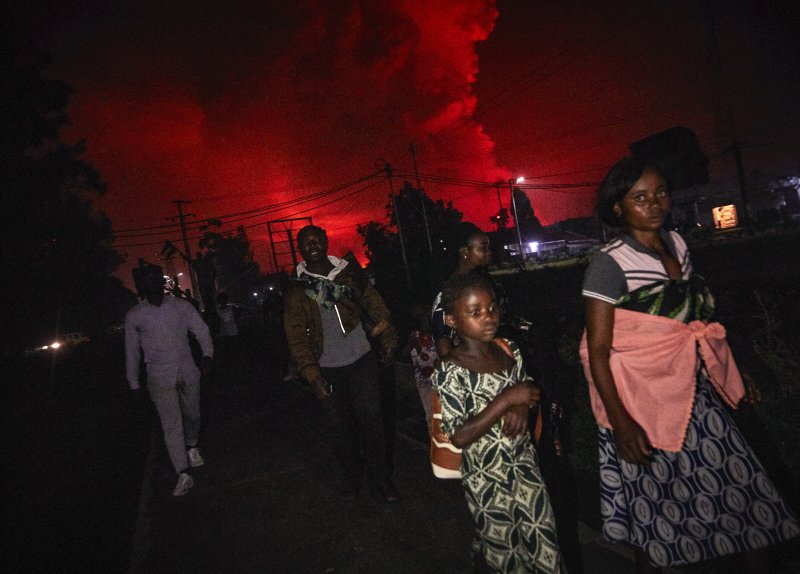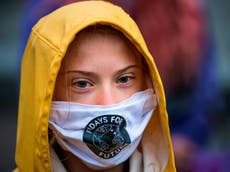U.N.: Belarus' 'abduction' of journalist escalates crackdown on civil society

A spokesman for the U.N. Human Rights Commission accused Belarus on Tuesday of abducting journalist Roman Protasevich over the weekend. Photo by EPA-EFE
May 25 (UPI) -- A United Nations Human Rights Commissioner official warned Tuesday that the Lukashenko regime's hijacking of a commercial airliner with intent to "abduct" a journalist on board represents a "new phase" in its crackdown on civil society.
Rupert Colville, spokesman for the U.N. commissioner, lambasted the government of Belarusian President Alexander Lukashenko during a press briefing concerning the arrest of journalist Roman Protasevich over the weekend.
"This arbitrary arrest is a sign of an extremely worrying escalation in the crackdown on dissenting voices, not just of journalists but also of Belarusian human rights defenders and other civil society actors, including those living abroad," he said.
Protasevich, an exiled journalist critical of Lukashenko, was on a Ryanair flight en route from Athens, Greece, to Vilnius, Lithuania, on Sunday when the plane landed under the escort of a Belarusian fighter jet in Minsk where he and his girlfriend, Sofia Sapaga, were arrested.
"The manner, through threat of military force, in which Protasevich was abducted from the jurisdiction of another state and brought within that of Belarus was tantamount to an extraordinary rendition," Colville said. "Such abuse of state power against a journalist for exercising functions that are protected under international law is receiving, and deserves, the strongest condemnation."
Belarus has said the downing of the plane was prompted by a bomb threat and Protasevich was arrested on charges of organizing mass riots and whose name was included in a national terrorist watch list.
On Monday, a video apparently shot by authorities shows Protasevich with marks on his face confessing to having led large-scale anti-government protests last year following August's widely discredited election that saw Lukashenko elected to a sixth term.
U.S. President Joe Biden had raised suspicions Protasevich made the confession under duress on Sunday, worries that Colville shares.
"We fear for Roman Protasevich's safety and wish to seek assurances that he is treated humanely and is not subjected to ill treatment or torture. His appearance on state TV last night was not reassuring, given that apparent bruising to his face, and the strong likelihood that his appearance was not voluntary and his 'confession' to serious crimes was forced."
Belarus opposition leader Sviatlana Tsikhanouskaya also raised concerns Tuesday from Vilnius, where she remains in exile, that the 26-year-old journalist has been tortured.
"He said that he is being treated lawfully but he is clearly beaten and under pressure," she said, Voice of America reported. "There is no doubt that he may be tortured."
According to Minsk-based Visana Human Rights Center, Protasevich's legal representatives have not been granted permission to speak with their client despite visiting the pre-trial detention center and other security facilities.
The Permanent Mission of the Republic of Belarus to the United Nations rejected Colville's comments in a strongly worded statement later Tuesday, calling him "a mid-level employee" without authorization to speak on issues of sovereign states.
The mission said Protasevich is a suspect in several criminal cases and was arrested in connection to an international search warrant, stating his arrest was made "on fully legitimate grounds."
"Mr. Colville's qualifications of Belarus' actions in relation to the detention of Mr. Protasevich, a citizen of Belarus, as 'unlawful,' 'arbitrary' and 'abuse' clearly show that the above official went beyond both his powers and the office's mandate," it said. "In so doing, he disregarded both the principle of impartiality that all U.N. international officials must consistently uphold and the doctrine of the presumption of innocence."
The office accused Western nations who have described the incident as state-sponsored hijacking did so without evidence.
"The Belarusian authorities, in accordance with their international obligations, invited these and other organizations, as well as the relevant competent authorities of the United States and the European Union to take part in the investigation," it said.
The comments were made a day after the EU swiftly decided to impose sanctions against the country and for EU aircraft to stay clear of Belarusian airspace as well as banning Minsk planes for landing at their airports. The United States also said it is considering punitive measures.
Both the bloc and the United States, among other western countries, have imposed sanctions and restrictions against the Lukashenko regime over Belarus' August election they deemed to be neither free nor fair and due its security forces escalating crackdown on subsequent protests that forced opposition leaders into exile.
The Viasna Human Rights Center has as of Wednesday tallied 421 political prisoners in the country, most of whom were arrested following the August election.
Following the EU's decision Monday, airlines and countries have said they will be staying clear of Belarus.
Ryanair said none of its flights will fly over Belarus in accordance with the EU guidance. Singapore Airlines, Air France, Lufthansa and British Airways are also avoiding the country.
Finnair announced it will also be discounting use of Belarus' airspace "until further notice."
Meanwhile, the governments of Britain, Lithuanian and others have said their aircraft will avoid Belarus' airspace.
Belavia, Belarus' airliner, announced that due to bans instituted by various countries against it landing at their airports, it was cancelling flights to and from Lithuania, Britain, France and the Ukraine.
In the United States, Biden has come under pressure to do more than issue statements concerning the arrest with U.S. Sens. Dick Durbin, D-Ill., and Marco Rubio, R-Fla., calling on him in a letter to direct the Federal Aviation Administration to prohibit U.S. aircraft from Belarus' air space.
Following the arrest, Biden issued a statement stating he has directed his administration to develop options in conjunction with EU and other partners to "hold accountable those responsible."
During a press conference Tuesday, White House Press Secretary Jen Psaki told reporters that "he's asked his team to put together some options for him."
Meanwhile, Belarus on Tuesday has decided to close its embassy in Canada as Prime Minister Justin Trudeau condemned Protasevich's arrest and said the Lukashenko regime's behavior is "outrageous, illegal and completely unacceptable."
"This was a clear attack on democracy and on the freedom of the press," he said during a press conference. "We condemn it and call for his immediate release."
Canada, which has previously sanctioned Belarus since August, is considering further options, he said.
It is unclear if the embassy's closure was in response to Trudeau's comments.
The embassy said it will suspend its services starting Sept. 1.









